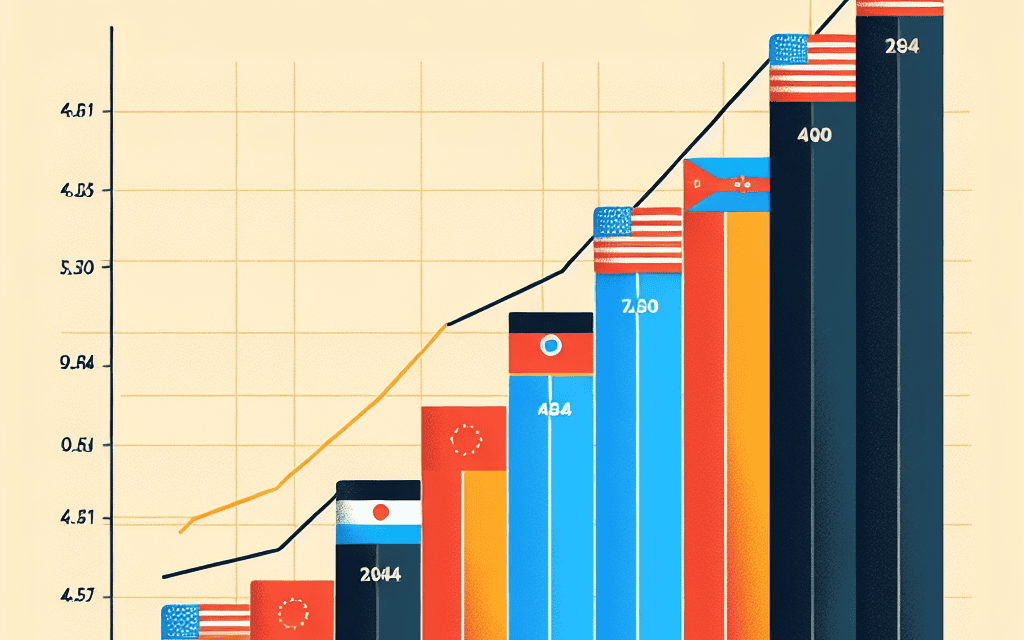“Venezuela’s Oil Exports Surge: Powering Global Markets with Renewed Energy”
Introduction
In recent developments, Venezuela’s oil exports have surged to a four-year high, marking a significant milestone for the country’s energy sector. This increase is largely attributed to heightened sales to major markets such as the United States and India. The resurgence in exports comes amid a backdrop of evolving geopolitical dynamics and strategic shifts in global energy demand. As Venezuela navigates complex international relations and economic challenges, this boost in oil exports represents a critical opportunity for economic revitalization and increased foreign exchange earnings. The renewed engagement with the US and India not only underscores Venezuela’s pivotal role in the global oil market but also highlights the potential for strengthened bilateral trade relations.
Venezuela’s Oil Export Surge: Key Factors Behind the 4-Year High
Venezuela’s oil exports have recently reached a four-year high, marking a significant milestone for the country’s beleaguered energy sector. This resurgence is primarily driven by increased sales to the United States and India, two of the world’s largest oil consumers. The rise in exports is a testament to Venezuela’s strategic efforts to revitalize its oil industry, which has long been hampered by economic sanctions, political instability, and infrastructural decay. Understanding the key factors behind this export surge provides insight into the complex dynamics of global energy markets and Venezuela’s evolving role within them.
One of the primary factors contributing to the increase in Venezuela’s oil exports is the easing of certain U.S. sanctions. In recent months, the U.S. government has shown a willingness to relax some of the restrictions imposed on Venezuela’s oil industry, allowing for more flexibility in trade. This shift in policy is partly motivated by the global energy crisis exacerbated by geopolitical tensions, such as the conflict in Ukraine, which has disrupted traditional energy supply chains. By permitting more Venezuelan oil to enter the market, the U.S. aims to stabilize global oil prices and ensure a steady supply for its domestic needs.
Simultaneously, India has emerged as a key destination for Venezuelan oil, driven by its growing energy demands and strategic diversification of energy sources. As one of the fastest-growing economies in the world, India requires a reliable and affordable energy supply to sustain its industrial and economic expansion. Venezuelan oil, often sold at a discount due to its heavy crude quality, presents an attractive option for Indian refineries. This mutually beneficial relationship has bolstered Venezuela’s export figures, providing a crucial revenue stream for the cash-strapped nation.
Moreover, Venezuela’s state-owned oil company, Petróleos de Venezuela, S.A. (PDVSA), has undertaken significant efforts to enhance its production capabilities. Despite facing numerous challenges, including outdated infrastructure and a lack of investment, PDVSA has managed to increase its output through strategic partnerships and technological improvements. Collaborations with foreign oil companies, particularly from China and Russia, have facilitated the transfer of technology and expertise, enabling PDVSA to optimize its operations and boost production levels.
In addition to these external factors, internal political developments have also played a role in Venezuela’s oil export resurgence. The government, led by President Nicolás Maduro, has made concerted efforts to stabilize the political climate and attract foreign investment. By implementing economic reforms and engaging in dialogue with opposition groups, the Maduro administration aims to create a more conducive environment for business and investment. These measures have instilled a degree of confidence among international stakeholders, encouraging them to re-engage with Venezuela’s oil sector.
While the recent surge in oil exports is a positive development for Venezuela, challenges remain. The country’s oil infrastructure is still in dire need of modernization, and the political situation remains fragile. Furthermore, the global energy landscape is rapidly evolving, with increasing emphasis on renewable energy sources and sustainability. Venezuela must navigate these complexities to ensure the long-term viability of its oil industry.
In conclusion, Venezuela’s oil export surge to a four-year high is the result of a confluence of factors, including eased U.S. sanctions, increased demand from India, strategic partnerships, and internal political efforts. This development underscores the intricate interplay between global energy markets and domestic policies, highlighting Venezuela’s potential to reassert itself as a significant player in the oil industry. However, sustaining this momentum will require continued investment, political stability, and adaptation to the changing global energy paradigm.
The Role of US and India in Venezuela’s Oil Export Revival
Venezuela’s oil industry, once a dominant force in the global energy market, has recently experienced a significant revival, marked by a four-year high in oil exports. This resurgence is largely attributed to increased sales to the United States and India, two countries that have played pivotal roles in revitalizing Venezuela’s oil export sector. Understanding the dynamics of this revival requires an examination of the geopolitical and economic factors that have facilitated these increased exports.
To begin with, the United States, historically one of Venezuela’s largest oil customers, has seen a renewed interest in Venezuelan crude. This shift comes after years of strained relations and sanctions that severely limited trade between the two nations. However, recent diplomatic efforts and a pragmatic approach to energy security have led to a cautious easing of restrictions, allowing for a gradual increase in oil imports from Venezuela. The United States, facing its own energy challenges and seeking to diversify its sources of crude oil, has found a mutually beneficial opportunity in re-engaging with Venezuela. This renewed trade relationship not only provides the U.S. with a reliable source of heavy crude, which is essential for its refineries, but also offers Venezuela a much-needed economic lifeline.
Simultaneously, India has emerged as a key player in Venezuela’s oil export revival. As one of the world’s largest consumers of oil, India has consistently sought to secure diverse and stable sources of energy to fuel its rapidly growing economy. Venezuela, with its vast reserves of heavy crude, presents an attractive option for India, which has been keen to strengthen its energy ties with the South American nation. The strategic partnership between India and Venezuela has been bolstered by favorable trade agreements and a shared interest in circumventing geopolitical tensions that have affected other oil-producing regions. This collaboration not only enhances India’s energy security but also provides Venezuela with a reliable market for its oil exports.
Moreover, the increased sales to the United States and India have been facilitated by improvements in Venezuela’s oil production capabilities. After years of decline due to mismanagement and lack of investment, the Venezuelan government has made concerted efforts to rehabilitate its oil infrastructure. This includes attracting foreign investment and expertise to revitalize its oil fields and refineries. The involvement of international partners has been crucial in overcoming technical challenges and boosting production levels, thereby enabling Venezuela to meet the growing demand from its key export markets.
In addition to these bilateral relationships, the global oil market’s dynamics have also played a role in Venezuela’s export revival. Fluctuations in global oil prices and shifts in supply chains have created opportunities for Venezuela to reassert itself as a competitive player. The country’s ability to offer discounted prices and flexible payment terms has made its oil particularly attractive to buyers looking to hedge against market volatility.
In conclusion, the role of the United States and India in Venezuela’s oil export revival cannot be overstated. Through strategic partnerships and pragmatic diplomacy, these nations have facilitated a resurgence in Venezuelan oil exports, providing economic benefits to all parties involved. As Venezuela continues to navigate the complexities of the global oil market, the sustained engagement of these key players will be essential in ensuring the long-term stability and growth of its oil industry.
Economic Implications of Venezuela’s Increased Oil Sales
Venezuela’s oil exports have recently reached a four-year high, marking a significant development in the global energy market. This surge in exports is primarily driven by increased sales to the United States and India, two of the world’s largest energy consumers. The implications of this development are multifaceted, affecting not only Venezuela’s economy but also the broader geopolitical landscape.
To begin with, the increase in oil exports provides a much-needed boost to Venezuela’s struggling economy. For years, the country has grappled with hyperinflation, political instability, and a humanitarian crisis that has left millions in poverty. Oil, being the cornerstone of Venezuela’s economy, accounts for nearly all of its export revenues. Therefore, the rise in oil exports is likely to enhance the country’s foreign exchange reserves, providing the government with more resources to address pressing economic challenges. This influx of revenue could potentially stabilize the national currency and improve the purchasing power of Venezuelans, albeit gradually.
Moreover, the renewed trade relations with the United States signify a thawing of diplomatic tensions that have persisted for years. The U.S. had imposed stringent sanctions on Venezuela’s oil industry, aiming to pressure the government into political reforms. However, the recent increase in oil sales suggests a shift in strategy, possibly driven by the global demand for energy and the need to diversify oil sources amid geopolitical uncertainties. This development could pave the way for more constructive dialogue between the two nations, potentially leading to a more stable political environment in Venezuela.
Simultaneously, India’s growing energy needs have made it a key player in Venezuela’s oil export strategy. As one of the fastest-growing economies, India requires a steady supply of energy to fuel its industrial and technological advancements. By increasing oil imports from Venezuela, India not only secures a vital energy source but also strengthens its geopolitical ties with Latin America. This relationship could lead to further economic cooperation, benefiting both nations in terms of trade and investment opportunities.
However, the implications of Venezuela’s increased oil exports extend beyond economic benefits. The environmental impact of heightened oil production cannot be overlooked. As the world grapples with climate change, the reliance on fossil fuels remains a contentious issue. While Venezuela’s economic recovery is crucial, it is equally important to consider sustainable practices that align with global environmental goals. Balancing economic growth with environmental responsibility will be a challenge that Venezuela must address as it navigates this new phase of increased oil exports.
In conclusion, Venezuela’s oil exports reaching a four-year high is a development with significant economic implications. The increased sales to the United States and India not only bolster Venezuela’s economy but also influence geopolitical dynamics. While this surge in exports offers a lifeline to Venezuela’s struggling economy, it also presents challenges that require careful management. As the country seeks to capitalize on this opportunity, it must also consider the broader implications for its political relations and environmental responsibilities. The path forward will require a delicate balance between economic recovery and sustainable development, ensuring that the benefits of increased oil exports are realized without compromising future stability.
Challenges and Opportunities in Venezuela’s Oil Export Strategy

Venezuela’s oil industry, long a cornerstone of its economy, has recently experienced a resurgence, with oil exports reaching a four-year high. This development is largely attributed to increased sales to the United States and India, two significant players in the global energy market. However, this resurgence is not without its challenges and opportunities, as Venezuela navigates a complex landscape of geopolitical tensions, economic sanctions, and domestic issues.
The increase in oil exports marks a significant turnaround for Venezuela, a country that has faced numerous obstacles in recent years. The imposition of international sanctions, particularly by the United States, had severely restricted Venezuela’s ability to sell its oil on the global market. These sanctions were primarily aimed at pressuring the Venezuelan government to implement democratic reforms. However, recent diplomatic engagements and a partial easing of these sanctions have opened new avenues for Venezuela to re-enter the global oil market, particularly with the United States. This renewed access to the U.S. market is a critical factor in the recent surge in exports, as it allows Venezuela to tap into one of the world’s largest oil consumers.
Simultaneously, India has emerged as another key destination for Venezuelan oil. India’s growing energy needs, driven by its expanding economy and population, have made it an attractive market for oil exporters. Venezuela’s ability to increase sales to India is indicative of its strategic pivot towards diversifying its customer base, thereby reducing its reliance on any single market. This diversification strategy not only mitigates risks associated with geopolitical tensions but also positions Venezuela to capitalize on emerging markets with high growth potential.
Despite these positive developments, Venezuela’s oil export strategy is fraught with challenges. The country’s oil infrastructure has suffered from years of underinvestment and mismanagement, leading to inefficiencies and production bottlenecks. To sustain and further increase its export levels, Venezuela must address these infrastructural issues, which require significant capital investment and technical expertise. Moreover, the global shift towards renewable energy sources poses a long-term challenge to oil-dependent economies like Venezuela. As countries worldwide commit to reducing carbon emissions, the demand for fossil fuels is expected to decline, necessitating a strategic reevaluation of Venezuela’s economic model.
In addition to these external challenges, Venezuela faces internal pressures that could impact its oil export strategy. Political instability and economic hardships have created a volatile environment that complicates efforts to attract foreign investment and expertise. Furthermore, social issues, such as poverty and unemployment, demand attention and resources, potentially diverting focus from the oil sector.
Nevertheless, the current high in oil exports presents an opportunity for Venezuela to leverage its natural resources to foster economic recovery and development. By reinvesting oil revenues into infrastructure improvements and diversifying its economy, Venezuela can build a more resilient economic foundation. Additionally, engaging in international partnerships and collaborations could provide the necessary technical support and investment to modernize its oil industry.
In conclusion, while Venezuela’s recent increase in oil exports to the United States and India is a promising development, it is accompanied by a complex array of challenges and opportunities. Navigating this landscape requires strategic foresight and adaptability, as Venezuela seeks to maximize the benefits of its oil resources while preparing for a future that may increasingly favor sustainable energy solutions.
Impact of Venezuela’s Oil Export Growth on Global Markets
Venezuela’s oil exports have recently reached a four-year high, marking a significant development in the global energy landscape. This surge in exports, primarily driven by increased sales to the United States and India, has implications that extend beyond the borders of Venezuela, influencing global oil markets and geopolitical dynamics. As Venezuela ramps up its oil production and export capabilities, the ripple effects are being felt across the world, prompting a reevaluation of energy strategies and economic forecasts.
The resurgence of Venezuela’s oil exports can be attributed to several factors, including the easing of certain international sanctions and the country’s efforts to revitalize its oil industry. The Venezuelan government has been actively seeking to restore its oil production capacity, which had been severely hampered by years of economic mismanagement and political instability. By investing in infrastructure and negotiating with international partners, Venezuela has managed to increase its output, thereby positioning itself as a more prominent player in the global oil market.
One of the most notable aspects of this development is the renewed trade relationship between Venezuela and the United States. Despite a history of strained diplomatic relations, the United States has emerged as a significant buyer of Venezuelan oil. This shift can be attributed to the changing dynamics of global energy demand and the strategic interests of both nations. For the United States, diversifying its sources of oil imports is crucial for energy security, especially in light of geopolitical tensions in other oil-producing regions. Meanwhile, Venezuela benefits from access to a lucrative market that can provide much-needed revenue to support its struggling economy.
In addition to the United States, India has also become a key destination for Venezuelan oil exports. As one of the world’s largest consumers of energy, India is constantly seeking reliable sources of oil to fuel its rapidly growing economy. The increased flow of Venezuelan oil to India not only strengthens bilateral trade relations but also underscores the shifting patterns of global energy consumption. India’s engagement with Venezuela highlights the importance of diversifying energy partnerships to ensure a stable supply of resources.
The impact of Venezuela’s oil export growth on global markets is multifaceted. On one hand, the increased supply of Venezuelan oil contributes to stabilizing global oil prices, which have experienced volatility due to various geopolitical and economic factors. By adding more barrels to the market, Venezuela helps to alleviate some of the pressure on supply chains, potentially leading to more predictable pricing for consumers and businesses worldwide.
On the other hand, the resurgence of Venezuelan oil exports also raises questions about the long-term sustainability of this growth. The country’s oil industry still faces significant challenges, including outdated infrastructure, a lack of investment, and ongoing political uncertainties. These factors could hinder Venezuela’s ability to maintain its current export levels, thereby affecting global supply dynamics in the future.
In conclusion, Venezuela’s achievement of a four-year high in oil exports, with increased sales to the United States and India, is a development with far-reaching implications for global markets. As Venezuela continues to navigate its complex economic and political landscape, the world will be closely watching how this resurgence influences energy strategies and market stability. The interplay between Venezuela’s oil industry and global demand will undoubtedly shape the future of energy geopolitics, making it a critical area of focus for policymakers and industry leaders alike.
Venezuela’s Oil Industry: Navigating Sanctions and Market Dynamics
Venezuela’s oil industry, long a cornerstone of its national economy, has recently experienced a significant resurgence, with oil exports reaching a four-year high. This development is particularly noteworthy given the complex landscape of international sanctions and shifting market dynamics that have shaped the country’s oil sector in recent years. The increase in exports is largely attributed to heightened sales to the United States and India, two major players in the global energy market. This uptick in exports marks a pivotal moment for Venezuela, as it navigates the challenges posed by economic sanctions while seeking to reestablish its position as a key oil supplier.
The resurgence of Venezuela’s oil exports can be traced back to several strategic adjustments made by the country’s state-owned oil company, Petróleos de Venezuela, S.A. (PDVSA). In response to the sanctions imposed by the United States and other countries, PDVSA has sought to diversify its customer base and explore new markets. This strategy has proven effective, as evidenced by the increased sales to India, a country with a rapidly growing demand for energy resources. India’s willingness to engage with Venezuela, despite the geopolitical complexities, underscores the importance of energy security and diversification in its national strategy.
Simultaneously, the United States has emerged as a significant destination for Venezuelan oil, a development that may seem surprising given the historical context of strained relations between the two nations. However, recent geopolitical shifts and the global energy crisis have prompted the U.S. to reconsider its energy partnerships. The need to stabilize domestic energy prices and ensure a steady supply of crude oil has led to a pragmatic approach, allowing for increased imports from Venezuela. This pragmatic shift highlights the intricate balance between political considerations and economic necessities that often characterizes international energy relations.
Moreover, the rise in Venezuela’s oil exports is not solely a result of external market dynamics. Domestically, the country has made concerted efforts to revitalize its oil production capabilities. Investments in infrastructure, technology, and workforce training have been prioritized to enhance the efficiency and output of oil extraction and processing. These efforts have begun to bear fruit, as evidenced by the increased production levels that have enabled Venezuela to meet the growing demand from international markets.
Nevertheless, the path forward for Venezuela’s oil industry is fraught with challenges. The ongoing sanctions continue to pose significant hurdles, limiting access to international financing and technology that are crucial for long-term growth and sustainability. Additionally, the global push towards renewable energy sources presents a looming challenge for oil-dependent economies like Venezuela. As countries worldwide intensify their efforts to transition to cleaner energy, Venezuela must navigate the delicate balance between capitalizing on its oil reserves and preparing for a future where fossil fuels may play a diminished role.
In conclusion, Venezuela’s recent increase in oil exports represents a significant achievement in the face of considerable obstacles. By strategically engaging with key markets such as the United States and India, and by investing in domestic production capabilities, Venezuela has managed to bolster its oil industry despite the challenges posed by international sanctions and evolving market dynamics. However, the future of Venezuela’s oil sector will depend on its ability to adapt to the changing global energy landscape while continuing to address the economic and political complexities that have long defined its oil industry.
Future Prospects for Venezuela’s Oil Exports Amid Global Energy Shifts
Venezuela’s oil exports have recently reached a four-year high, marking a significant milestone in the nation’s efforts to revitalize its energy sector. This resurgence is largely attributed to increased sales to major markets such as the United States and India. As the global energy landscape undergoes significant shifts, Venezuela’s position as a key player in the oil industry is being re-evaluated. The implications of this development are multifaceted, encompassing economic, geopolitical, and environmental dimensions.
To begin with, the increase in oil exports is a crucial economic lifeline for Venezuela, a country that has faced severe economic challenges in recent years. The oil sector, which accounts for a substantial portion of the nation’s revenue, has been hampered by a combination of factors, including international sanctions, mismanagement, and declining infrastructure. However, the recent uptick in exports suggests a potential turnaround. By tapping into the US and Indian markets, Venezuela is diversifying its customer base, which could lead to more stable and sustainable economic growth. This diversification is particularly important given the volatile nature of global oil prices and the ongoing geopolitical tensions that can impact trade relations.
Moreover, the renewed interest from the United States and India in Venezuelan oil is indicative of broader trends in the global energy market. As countries seek to balance their energy needs with environmental commitments, there is a growing demand for reliable sources of oil. Venezuela, with its vast reserves, is well-positioned to meet this demand. However, this opportunity comes with challenges. The country must navigate complex geopolitical dynamics, particularly with the United States, where relations have been strained. The ability to maintain and expand these export relationships will depend on Venezuela’s diplomatic strategies and its capacity to address international concerns regarding governance and human rights.
In addition to economic and geopolitical considerations, the environmental implications of increased oil exports cannot be overlooked. As the world grapples with the urgent need to transition to cleaner energy sources, Venezuela’s reliance on oil presents a paradox. On one hand, the country needs to capitalize on its natural resources to foster economic recovery. On the other hand, there is a global push towards reducing carbon emissions and investing in renewable energy. This dichotomy presents a strategic challenge for Venezuela: how to leverage its oil wealth while aligning with global sustainability goals. The answer may lie in adopting more environmentally friendly extraction and production practices, which could enhance the country’s reputation and appeal to environmentally conscious markets.
Looking ahead, the future prospects for Venezuela’s oil exports will be shaped by its ability to adapt to these evolving dynamics. The country must invest in modernizing its oil infrastructure to improve efficiency and reduce environmental impact. Additionally, fostering stronger international partnerships and engaging in multilateral dialogues will be crucial in navigating the complex web of global energy politics. As the world continues to shift towards a more sustainable energy paradigm, Venezuela’s role in this transition will be pivotal. By strategically positioning itself within the global energy market, Venezuela can not only boost its economy but also contribute to a more balanced and sustainable energy future. In conclusion, while challenges remain, the recent surge in oil exports offers a promising glimpse into the potential for Venezuela to reclaim its status as a major player in the global oil industry.
Q&A
1. **What recent milestone has Venezuela’s oil exports achieved?**
Venezuela’s oil exports have reached a four-year high.
2. **Which countries have seen increased oil sales from Venezuela?**
The United States and India have seen increased oil sales from Venezuela.
3. **What factors have contributed to the increase in Venezuela’s oil exports?**
Factors include improved relations with the U.S., easing of sanctions, and increased production capacity.
4. **How has the U.S. involvement changed in Venezuela’s oil exports?**
The U.S. has increased its purchase of Venezuelan oil, partly due to geopolitical shifts and energy needs.
5. **What impact has the increase in oil exports had on Venezuela’s economy?**
The increase has provided a boost to Venezuela’s economy, offering more revenue and potential for economic stabilization.
6. **What challenges does Venezuela still face despite the increase in oil exports?**
Challenges include ongoing political instability, infrastructure issues, and the need for further investment in the oil sector.
7. **How has the global oil market reacted to Venezuela’s increased exports?**
The global oil market has seen adjustments in supply dynamics, with potential impacts on oil prices and trade flows.
Conclusion
Venezuela’s oil exports reaching a four-year high, driven by increased sales to the United States and India, marks a significant development in the global energy market. This resurgence in exports highlights Venezuela’s efforts to revitalize its oil industry despite ongoing economic and political challenges. The increased sales to the US suggest a potential easing of geopolitical tensions or strategic economic interests, while the growing exports to India reflect the latter’s rising energy demands and diversification of supply sources. This trend could have implications for global oil prices and the geopolitical landscape, as Venezuela seeks to re-establish itself as a key player in the international oil market.





